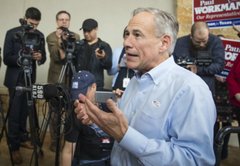Repeal limits on students taking online classes
Greg Abbott
Public school students should be allowed to take any Virtual School Network course even if it's offered in person at their school. Also, the state cap of three VSN courses per student should be repealed.
Abbott-O-Meter
Promise Broken

